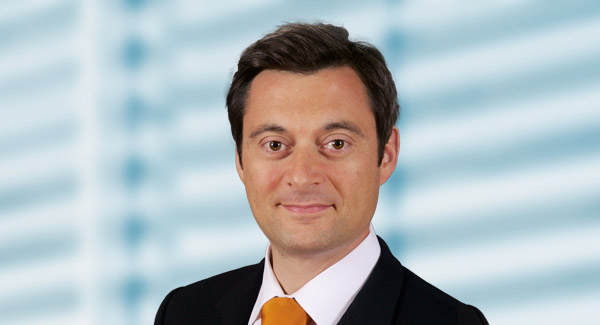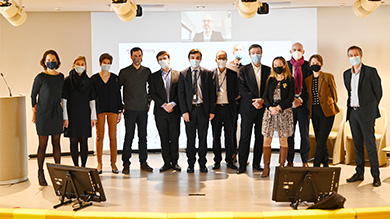2020 ROUND-UP: this has been a challenging year in every way for investors, with the health crisis particularly taking its toll. Here Julien Dauchez tells us more about the Natixis Investment Managers survey with financial advisors that he conducted and talks about how these managers supported their clients in France, as well as outlining the main asset allocation trends advisors have adopted this year.

JULIEN
DAUCHEZ
Head of Portfolio Consultants in the Solutions team – Natixis Investment Managers
What was the rationale behind developing this survey with financial advisors?
We set up the survey in France already four years ago, and it has also been launched in a range of other countries, including the UK, Spain, Italy and South America. The survey analyzes financial advisors’ portfolios to offer insight into their concerns and expectations, and also involves discussions with them to get their input on both the risks and opportunities they see in the current financial environment. This portfolio assessment is useful in two respects – financial advisors, such as French so-called CGP or wealth management advisors, can compare their take on risk and their portfolio performances with peers, and also seek reassurance on the main investment trends on the market.
What changes have you seen over this past year?
Interest rates are very low, so fund managers and financial advisors were already on the hunt for attractive returns, and this trend further picked up in 2020, with portfolios allocating more into credit.
More interestingly, attitudes to stocks and shares are changing in France with equity investments becoming increasingly accepted as the best way to finance long-term life plans, marking a significant cultural shift. This helps finance the economy and drives momentum for French enterprises, and this trend is now visible in financial advisors’ model portfolio construction.
How have financial advisors addressed the crisis situation triggered by the Covid-19 pandemic?
Both financial advisors and end clients have seen this primarily as a health crisis. The value of portfolios obviously underwent major fluctuations, but investors did not give in to panic or sell their shares, and this meant they were able to reap the benefits of the subsequent very strong asset rebound, when French equities recovered close to 35% in the space of six weeks.
How do financial advisors successfully develop balanced portfolios?
Advisors seek out sources of yield that offer alternatives to traditional fixed income investments. New illiquid assets such as private equity or private debt, property investments via diversified real estate investment trusts, as well as structured products make up an increasing portion of advisors’ portfolios. Advisors have also revisited gold in their portfolios to a certain extent, and this move is geared to providing hedging against the risk of debasement of the major currencies *. Liquid alternative strategies are also in demand again, after investors put them on the back burner over recent years. We have also observed a shift in advisory services themselves, as the growing availability of portfolio analysis services and the reliance on robo-advisors are freeing up financial advisors’ time and providing opportunities for closer client relationships and greater support on wealth planning.
What new trends developed in 2020?
The two key trends that characterized 2020 are SRI funds ** and thematic funds, which have attracted strong investor interest.
Looking firstly to SRI funds, France has enjoyed a sharp surge in socially responsible investment in 2020 to a greater extent than other countries, driven by both social factors and regulation – a prime example of this is the French PACTE act (Business Growth and Transformation Action Plan). However, this enthusiasm for SRI did not happen overnight: northern European countries began taking on board investment drawing on ESG criteria at the start of the century, before awareness then began to grow in the rest of Europe over the past two decades. ESG is now automatically included in solutions offered, and we can observe this trend in financial advisors’ portfolios in France. The movement also seems to have taken root in the United States, which is also getting involved in these investments. SRI funds are enjoying roaring success in Europe as a result of non-financial performances on offer, as well as their robust resilience during the Covid-19 crisis.
Thematic funds have also been real success stories in asset allocation during 2020. The economy is changing and becoming more digital, city life is evolving and remote working is becoming more widespread. The Covid-19 pandemic has been a real catalyst for change in the way we live, consume and work, and thematic funds devoted to water or robotics support and fund society’s change and modernization.
What can we expect in 2021?
Interest rates remain very low due to accommodative central bank policies worldwide, while bonds’ lackluster performance potential naturally encourages investors to look to more risky assets. Against this backdrop, diversification and stock-picking will be the watchwords for asset allocation in 2021. Financial advisors and their clients will need to take on board greater risk in their portfolios if they are to achieve their financial goals, so an active investment approach will be the best way to plot a course through these challenging market conditions.
* Risk of currency debasement: decrease in the value of a currency due to overly accommodative monetary policy and governments printing more money.
** Socially responsible investment (SRI): these investments are designed to combine financial performance with social and environmental impact by funding companies that support sustainable development across all business sectors.



















